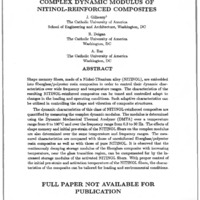-
Title
-
Complex Dynamic Modulus Of Nitinol-Reinforced Composites
-
Report Number
-
WL-TR-91-3078 Volume III, p. JAA-1
-
Creator
-
Gilheany, J .
-
Deigan, R.
-
Baz, A.
-
Corporate Author
-
The Catholic University of America
-
Date
-
1991
-
Date Issued
-
1991-08
-
Extent
-
1
-
Identifier
-
ADA241313
-
Format
-
1 online resource
-
Abstract
-
Shape memory fibers, made of a Nlckel-Tltanium alloy (NITINOL), are embedded
into :fiberglass/polyester resin composites in order to control their dynamic characteristics
over wide frequency and temperature ranges. The characteristics of the
resulting NITINOL-reinforced composites can be tuned and controlled adapt to
changes in the loading and operating conditions. Such adaptive characteristics can
be utilized in controlling the shape and vibration of composite structures.
The dynamic characteristics of this class of NITINOL-reinforced composites are
quantified by measuring the complex dynamic modulus. The modulus is determined
using the Dynamic Mechanical Thermal Analyzer (DMTA) over a temperature
range from O to 100°C and over the frequency range from 0.3 to 30 Hz. The effects of
shape memory and initial pre-strain of the NITINOL fibers on the complex modulus
are also determined over the same temperature and frequency ranges. The measured
characteristics are compared with those of unreinforced :fiberglass/polyester
resin composites as well as with those of pure NITINOL. It is observed that the
continuously decaying storage modulus of the fiberglass composite with increasing
temperature, near the glass transition region, can be compensated for by the increased
storage modulus of the activated NITINOL fibers. With proper control of
the initial pre-strain and activation temperature of the NITINOL fibers, the characteristics
of the composite can be tailored for loading and environmental conditions.
FULL PAPER NOT AVAILABLE FOR
PUBLICATION
-
Description
-
Shape memory fibers, made of a Nlckel-Tltanium alloy (NITINOL), are embedded
into :fiberglass/polyester resin composites in order to control their dynamic characteristics
over wide frequency and temperature ranges. The characteristics of the
resulting NITINOL-reinforced composites can be tuned and controlled adapt to
changes in the loading and operating conditions. Such adaptive characteristics can
be utilized in controlling the shape and vibration of composite structures.
The dynamic characteristics of this class of NITINOL-reinforced composites are
quantified by measuring the complex dynamic modulus. The modulus is determined
using the Dynamic Mechanical Thermal Analyzer (DMTA) over a temperature
range from O to 100°C and over the frequency range from 0.3 to 30 Hz. The effects of
shape memory and initial pre-strain of the NITINOL fibers on the complex modulus
are also determined over the same temperature and frequency ranges. The measured
characteristics are compared with those of unreinforced :fiberglass/polyester
resin composites as well as with those of pure NITINOL. It is observed that the
continuously decaying storage modulus of the fiberglass composite with increasing
temperature, near the glass transition region, can be compensated for by the increased
storage modulus of the activated NITINOL fibers. With proper control of
the initial pre-strain and activation temperature of the NITINOL fibers, the characteristics
of the composite can be tailored for loading and environmental conditions.
FULL PAPER NOT AVAILABLE FOR
PUBLICATION
-
Distribution Classification
-
1
-
Distribution Conflict
-
No
-
DTIC Record Exists
-
No
-
Illinois Tech Related
-
No
-
Photo Quality
-
Not Needed
-
Report Availability
-
Full text available
 articleJAA
articleJAA